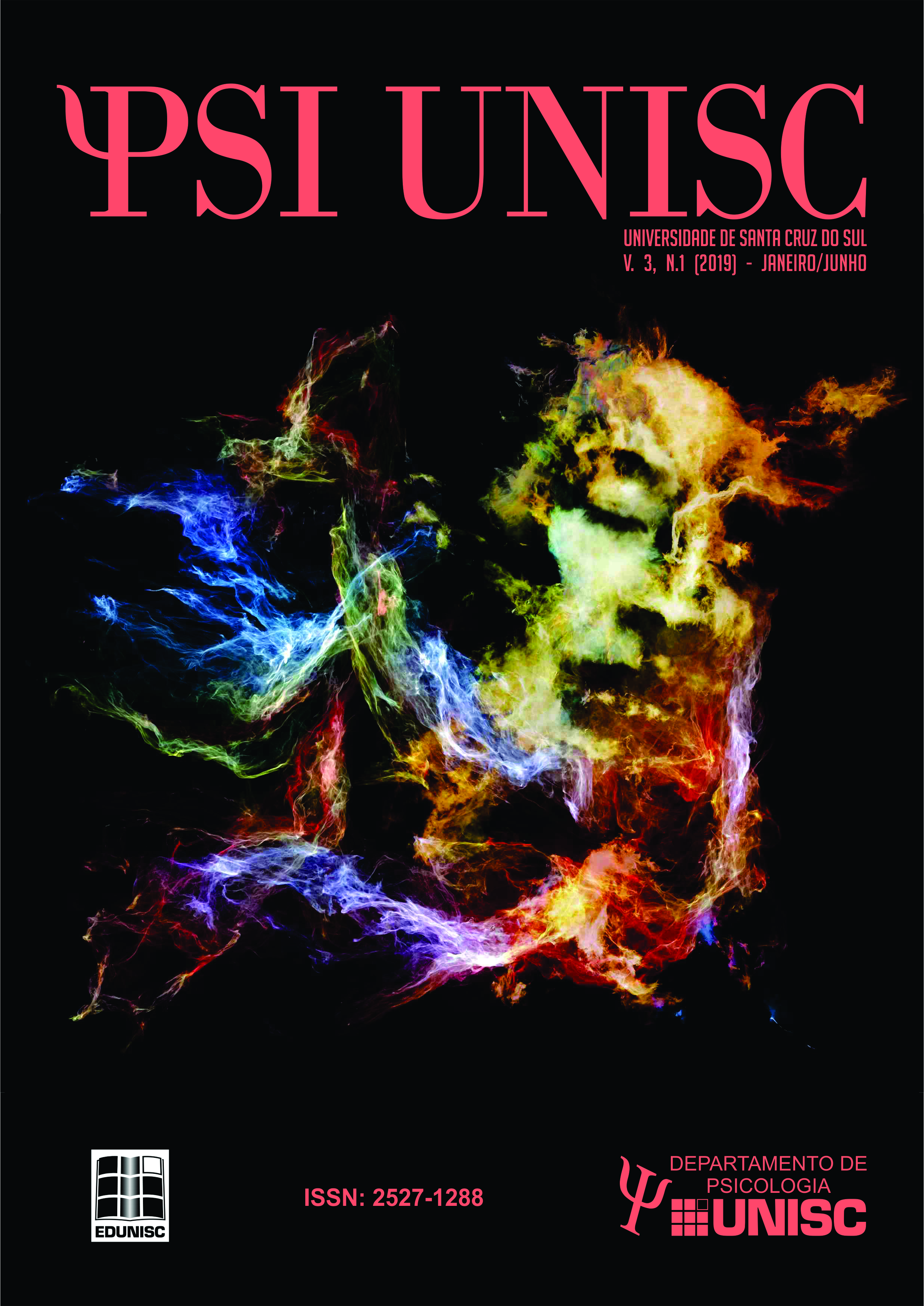Contribuições do Modelo Bioecológico à Análise do Desemprego sob a Perspectiva Familiar e de Gênero
DOI:
https://doi.org/10.17058/psiunisc.v3i1.12583Palavras-chave:
Desemprego, Modelo bioecológico, Dinâmica familiar, GêneroResumo
O desemprego enquanto fenômeno psicológico torna-se, em tempos de recessão econômica, um objeto de estudo de particular interesse. Ampla é a literatura acerca das consequências negativas do desemprego sobre o bem-estar das pessoas nesta situação. No entanto, observa-se que um grande número dos estudos centra-se somente na pessoa em desemprego e em variáveis individuais (tais como idade, sexo, características de personalidade e duração do desemprego, por exemplo). O objetivo da presente revisão narrativa de literatura, foi apresentar como o modelo bioecológico pode contribuir para a análise do fenômeno do desemprego, conferindo complexidade e dinamismo na abordagem desta problemática. A pesquisa bibliográfica foi feita nas bases de dados Academic Search Complete, PsycArticles, PsycInfo, Scielo, Scopus e SocIndex. Considerando a família como uma teia complexa de relações sistêmicas, onde as interações se dão de forma bidirecional, compreende-se que seus diferentes subsistemas são afetados por pressões externas, mas também podem agir proativamente na preservação de um equilíbrio interno de funcionamento. Observou-se que o gênero é uma dimensão marcante para a articulação dos papéis familiares e profissionais, sendo esta uma variável que atravessa e condiciona a experiência de desemprego nas famílias heteronormativas com maior adesão aos papéis tradicionais de gênero. O presente trabalho integra parte da tese de doutorado da autora.
Downloads
Referências
Aguiar, J. (2017). O papel do gênero na experiência do desemprego de casais portugueses e brasileiros. Tese de Doutorado não-publicada. Faculdade de Psicologia e Ciências da Educação da Universidade do Porto, Portugal.
Aguiar, J., Matias, M., Barham, E. J., & Fontaine, A. M. (2018). Efeitos do desemprego sobre o casal: Uma revisão sistemática. Gerais: Revista Interinstitucional de Psicologia, 11(1), 174-189.
Aguiar, J., Matias, M., & Fontaine, A. M. (2017). Desemprego, satisfação com a vida e satisfação conjugal em portugueses e brasileiros. Revista Psicologia: Organizações e Trabalho, 17(4), 210-217. doi: 10.17652/rpot/2017.4.13751
Aoki, N. J., Enticott, J. C. & Phillips, L. E. (2013). Searching the literature: Four simple steps. Transfusion, 53(1), 14-17. doi: 10.1111/j.1537-2995.2012.03790.x
Auspurg, K., Iacovou, M. & Nicoletti, C. (2017). Housework share between partners: Experimental evidence on gender-specific preferences. Social Science Research, 66, 118-139.
Bronfenbrenner, U. (1996). A ecologia do desenvolvimento humano: Experimentos naturais e planejados. Porto Alegre: Artes Médicas
Bronfenbrenner, U., & Morris, P. A. (1998). The ecology of developmental processes. In W. Damon (Ed.), Handbook of child psychology (5th ed., Vol. 1, pp. 993-1028). New York: Wiley
Coelho-Lima, F.,Costa, A. L. F. & Bendassolli, P. F. (2013). A produção científica da Psicologia brasileira acerca do desemprego. Universitas Psychologica, 12(4), 1283-1299. doi: 10.11144/Javeriana.UPSY12-4.pcpb.
Davis, S. N., & Greenstein, T. N. (2013). Why study housework? Cleaning as a window into power in couples. Journal of Family Theory & Review, 5(2), 63–71. doi; 10.1111/jftr.12004
Deaux, K., & Major, B. (1987). Putting gender into context: An interactive model of gender-related behavior. Psychological Review, 94, 369-389. doi: 10.1037/0033-295X.94.3.369.
Eagly, A. H., & Wood, W. (2013). The nature-nurture debates: 25 years of challenges in understanding the psychology of gender. Perspectives on Psychological Science, 8(3), 340–357.
Eliason, M. & Storrie, D. (2009). Job loss is bad for your health – Swedish evidence on cause-specific hospitalization following involuntary job loss. Social Science & Medicine, 68(8), 1396-1406. doi: 10.1016/j.socscimed.2009.01.021
Estramiana, J. L. A., Gondim, S. M. G., Luque, A. G., Luna, A. F. & Dessen, M. C. (2012). Desempleo y bienestar psicológico en Brasil y España: Un estudio comparativo. Revista Psicologia: Organizações e Trabalho, 12(1), 5–16. Recuperado de http://submission-pepsic.scielo.br/index.php/rpot/index
Ferreira, S., Pedro, M. F. & Francisco, R. (2015). Entre marido e mulher, a crise mete a colher: A relação entre pressão económica, conflito e satisfação conjugal. Psicologia, 29(1), 11-22. Recuperado de http://www.scielo.mec.pt/scielo.php?script=sci_arttext&pid=S0874-20492015000100002&lng=pt&tlng=pt.
Fryer, D. (1986). Employment deprivation and personal agency during unemployment: A critical discussion of Jahoda’s explanation of the psychological effects of unemployment. Social Behaviour, 1, 3-23. Recuperado de http://psycnet.apa.org/record/1989-24290-001
Fryer, D. (1997). Agency restriction. In N. Nicholson (Ed.), The Blackwell encyclopedic dictionary of organizational psychology. Oxford, England: Blackwell.
Haid, M-L. & Seiffge-Krenke, I. (2013). Effects of (un)employment on young couples’ health and life satisfaction. Psychology and Health, 28(3), 284–301. doi: 10.1080/08870446.2012.720983.
Herbig, B., Dragano, N. & Angerer, P. (2013). Health in long-term unemployed. Deutsches Arzteblatt International, 110(23-24), 413-419. doi: 10.3238/arztebl.2013.0413
Heretick, D. (2013). Clinicians’ reports of the impact of the 2008 financial crisis on mental health clients. Journal of Social, Behavioral, and Health Sciences, 7(1), 1-21. doi: 10.5590/JSBHS.2013.07.1.01
Hirata, H. (2014). Gênero, classe e raça: Interseccionalidade e consubstancialidade das relações sociais. Tempo Social, 26(1), 61-73.
Jahoda, M. (1982). Employment and unemployment. A socio-psychological analysis. Cambridge: Press of University of Cambridge.
Jahoda, M., Lazarsfeld, P., & Zeisel, H. (2003). Marienthal: The sociography of an unemployed community. New Brunswick, Transaction Publisher.
Knabe, A., Schöb, R. & Weimann, J. (2015). Partnership, gender, and the well-being cost of unemployment. Social Indicators Research, 124(2), 1–21. doi: 10.1007/s11205-015-1167-3.
Lawrence, C. N. (2011). Writing a literature review in social sciences. Recuperado de https://www.academia.edu/2911352/Writing_a_Literature_Review_in_the_Social_Sciences
Martinengo, G., Jacob, J. I. & Hill, E. J. (2010). Gender and the Work-Family Interface: Exploring Differences Across the Family Life Course. Journal of Family Issues, 31(10), 1363-1390. doi: 10.1177/0192513x10361709
Michaud, P.C., Crimmins, E. M. & Hurd, M. D. (2016). The effect of job loss on health: Evidence from biomarkers. Labour Economics, 41, 194-203. doi: 10.1016/j.labeco.2016.05.014
Nitsche, N. & Grunow, D. (2016). Housework over the course of relationships: Gender ideology, resources, and the division of housework from a growth curve perspective. Advances in Life Course Research, 29, 80-94. doi: 10.1016/j.alcr.2016.02.001
Parsons, T. (1964). Family structure and the socialization of the child. In T. Parsons & R. F. Balles (Eds.), Family, socialization and interaction process (pp. 35- 133). London: Routledge & Kegan Paul.
Poeschl, G. (2010). Desigualdades na divisão do trabalho familiar, sentimento de justiça e processos de comparação social. Análise Psicológica, 28(1), 29-42.
Procter, N., Papadopoulos, I., & McEvoy, M. (2010). Global economic crises and mental health. Advances in Mental Health, 9, 210-214.
Relvas, A. P. (1996). O ciclo vital da família: Perspectiva sistémica. Porto: Edições Afrontamento.
Ribeiro, M. A. (2010). Estratégias micropolíticas para lidar com o desemprego: Contribuições da psicologia social do trabalho. Psicologia Política, 9(18), 331–346.
Rother, E. T. (2007). Revisão sistemática x revisão narrativa. Editorial. Acta Paulista de Enfermagem, 20(2). doi: 10.1590/S0103-21002007000200001
Sage, D. (2017). Reversing the negative experience of unemployment: A mediating role for social policies? Social Policy Administration, 52(5), 1043-1059. doi: 10.1111/spol.12333
Santos, M. (2015). Unemployment, mental health worker and suicide: A systematic review. European Psychiatry, 30(1), 28-31. doi: 10.1016/S0924-9338(15)30295-9
Vieira, C. M. C. (2006). É menino ou menina? Género e educação em contexto familiar. Coimbra: Almedina.
Wall, K., Cunha, V., Atalaia, S., Rodrigues, L., Correia, R. V. & Rosa, R. (2016). Livro Branco. Homens e igualdade de género em Portugal. Lisboa: Instituto de Ciências Sociais.
West, C., & Zimmerman, D. H. (1987). Doing gender. Gender and Society 2(1), 125-151.doi: 10.1177/0891243287001002002.
Downloads
Publicado
Como Citar
Edição
Seção
Licença
A submissão de originais para este periódico implica na transferência, pelos autores, dos direitos de publicação impressa e digital. Os direitos autorais para os artigos publicados são do autor, com direitos do periódico sobre a primeira publicação. Os autores somente poderão utilizar os mesmos resultados em outras publicações indicando claramente este periódico como o meio da publicação original. Em virtude de sermos um periódico de acesso aberto, permite-se o uso gratuito dos artigos em aplicações educacionais e científicas desde que citada a fonte conforme a licença CC-BY da Creative Commons.




